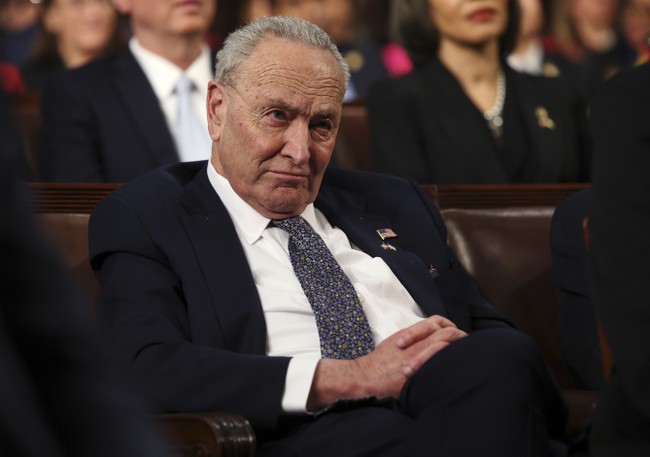On election day, Senate Minority Leader Chuck Schumer’s refusal to publicly back or repudiate New York mayoral candidate Zohran Mamdani is getting called out, raising questions about leadership, party unity, and political courage in a high-stakes local race that sits squarely inside his own state.
I laughed months ago at Sen. John Kennedy’s “go to Amazon and buy a spine online” jab, and the line still lands because it points at a real problem: leaders who won’t declare themselves when it matters. That comparison stings here because this is about New York City, a place Schumer represents politically and where he could influence his party’s direction. On November 4, the senator reportedly voted early but would not say whether he voted for Mamdani, a silence that looks less like prudence and more like avoidance.
Senator Chuck Schumer of New York, the dean of New York’s congressional delegation and an avatar of old New York politics, made it to Election Day without endorsing Zohran Mamdani, the young Democratic nominee for mayor with leftist views.
Mr. Schumer, who voted early, was reticent on Tuesday to even say whom he cast his ballot for.
A spokesman for Mr. Schumer would not say whether he had voted for Mr. Mamdani.
Way to take a stand, Chuck!
Some Democrats have already spoken up. House Minority Leader Hakeem Jeffries endorsed Mamdani in October despite widespread hand-wringing, which at least shows some willingness to choose a side. Schumer’s silence stands out because it’s not just a private choice; it’s a public leadership vacuum. When the party’s most visible Senate leader won’t weigh in on a major city contest in his home state, it sends a message that leadership can be noncommittal and defensive rather than decisive.
Republican critics are making a point that goes beyond partisan sniping: they argue Democrats are allowing ideological extremes to reshape the party and that figures like Schumer are either unwilling or unable to confront that shift. House Speaker Mike Johnson said Schumer is “terrified” of Mamdani, a claim meant to frame the senator as weak in the face of leftist pressure. Whether you agree with that rhetoric or not, the perception of fear or indecision matters politically and electorally.
Arguments about generational change and movement politics are now coming from inside the liberal world as well, complicating Schumer’s posture. Ben Rhodes described the senator’s silence as emblematic of “what’s wrong with the Democratic Party,” calling out an “aging insider refusing to support a young generational talent.” That exact phrasing captures a tension between old-guard power brokers and upstart activists that is playing out in real time on voting day.
“It is hard to imagine something more emblematic of what’s wrong with the Democratic Party than an aging insider refusing to support a young generational talent who has built a movement that looks like the future,” said Ben Rhodes, who worked as a top adviser to former President Barack Obama.
Former President Obama, according to reports, has not formally endorsed Mamdani either, though he has been described as “encouraging.” That half-measure mirrors the broader pattern: influence without commitment, applause without action. For voters and activists who want clear leadership, that’s unsatisfying and politically consequential in a city facing crime, homelessness, and economic strain.
I’m not endorsing Mamdani here, and many conservatives and centrists have strong reservations about his policies. The complaint at issue is more basic: if Schumer disapproves of this candidate, say so plainly. Leaders who sit on the fence in crucial moments risk looking cowardly, and that perception can shrink their authority at home and across the aisle. A senator who presides over a significant partisan standoff in Washington should at least demonstrate the backbone to state his position on a major municipal contest in his own state.
Critics also point to Schumer’s recent political record — from the shutdown fight to rhetoric some see as dividing — and argue his long tenure deserves more accountability. If his approach is to avoid alienating any faction, the result may be alienation across the board: his base sees indecision, opponents see weakness, and independent voters see a leadership deficit. That’s a risky position for someone who has been a central figure in Democratic politics for years.
An editor’s note in the original framing calls the situation a “Schumer Shutdown” and accuses Democrats of prioritizing other goals over practical governance. That wording reflects a broader partisan critique, and it’s part of why this silence on Mamdani resonates beyond mere local politics. When leadership looks inert, national arguments about priorities and competence amplify the consequences of a single mayoral contest.
Ultimately, the issue isn’t only whether anyone likes Mamdani. It’s about what voters expect from elected leaders: clarity, courage, and conviction. A public figure of Schumer’s stature choosing silence on a major election invites scrutiny, fuels intra-party disputes, and hands opponents a narrative about the party’s direction that could stick long after the ballots are counted.
Editor’s Note: The Schumer Shutdown is here. Rather than put the American people first, Chuck Schumer and the radical Democrats forced a government shutdown for healthcare for illegals. They own this.





Add comment